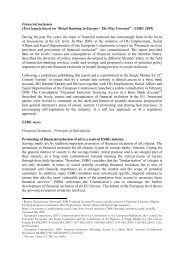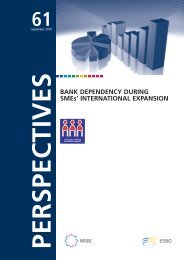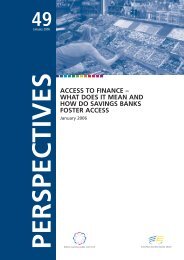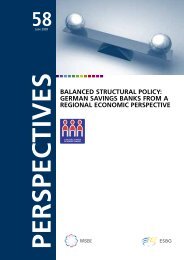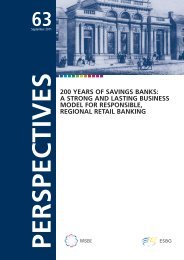Corporate Governance and Access to Finance - ESBG
Corporate Governance and Access to Finance - ESBG
Corporate Governance and Access to Finance - ESBG
Create successful ePaper yourself
Turn your PDF publications into a flip-book with our unique Google optimized e-Paper software.
Specifically they focused on the interests of deposi<strong>to</strong>rs as well as those ofshareholders, asserting that “given the important financial intermediationrole of banks in an economy, the public <strong>and</strong> the market have a highdegree of sensitivity <strong>to</strong> any difficulties potentially arising from anycorporate governance shortcomings in banks. <strong>Corporate</strong> governance isthus of great relevance both <strong>to</strong> individual banking organisations <strong>and</strong><strong>to</strong> the international financial system as a whole, <strong>and</strong> merits targetedsupervisory guidance”. More specifically, the report recommends thatbanking supervisors provide guidance for bank <strong>Corporate</strong> <strong>Governance</strong>best practices <strong>and</strong> determine whether those have been implemented.According <strong>to</strong> Jaime Caruana, the then Chairman of the BCBS <strong>and</strong> nowManaging Direc<strong>to</strong>r of the BIS, “effective <strong>Corporate</strong> <strong>Governance</strong> is essential<strong>to</strong> maintaining public trust <strong>and</strong> confidence in the banking sec<strong>to</strong>r, <strong>and</strong>provides a crucial anchor for sound risk management practices“.For a recent contribution <strong>to</strong> the debate from the UK perspective seeWalker Review (2009), which emphasizes five key themes: (i) the validityof the “comply or explain” approach, according <strong>to</strong> which adherence <strong>to</strong><strong>Corporate</strong> <strong>Governance</strong> Codes should be voluntary, but departure fromst<strong>and</strong>ards should be explained; (ii) the time commitment of Non-Executive Direc<strong>to</strong>rs (NEDs) should be increased; (iii) the Board needs <strong>to</strong> bemore engaged in risk policies <strong>and</strong> the profile of the Chief Risk Officer(CRO) needs <strong>to</strong> be enhanced; (iv) Fund managers <strong>and</strong> other majorshareholders should be more involved in investee companies <strong>and</strong> (v) theBoard oversight of remuneration policies should be reinforced.The present global financial crisis illustrates that, when manager’sdecisions are guided exclusively by short term shareholders’ wealthmaximization, instead of being accountable <strong>to</strong> multi-stakeholders, costsoutweigh benefits. In this context, there seems <strong>to</strong> be a consensus aroundthe idea that regulation <strong>and</strong> supervision of banks should be basicallyaimed at safeguarding deposi<strong>to</strong>rs’ interests <strong>and</strong> preventing disturbancesin the financial system arising from bank failures. Despite the specificitiesof different types of financial institutions, their <strong>Corporate</strong> <strong>Governance</strong>schemes require, as a rule, a broader focus on all stakeholders.98



